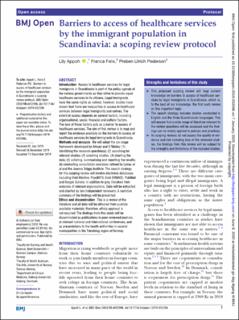Barriers to access of healthcare services by immigrant population in Scandinavia : a scoping review protocol
Peer reviewed, Journal article
Published version

Åpne
Permanent lenke
https://hdl.handle.net/11250/2660890Utgivelsesdato
2020Metadata
Vis full innførselSamlinger
Originalversjon
Appoh, L., Felix, F., & Pedersen, P. U. (2020). Barriers to access of healthcare services by immigrant population in Scandinavia: a scoping review protocol. BMJ Open, 10(1): e032596. doi: 10.1136/bmjopen-2019-032596Sammendrag
Introduction Access to healthcare services for legal immigrants in Scandinavia is part of the policy agenda of the various governments as they strive to provide equal healthcare services to its citizens. Legal immigrants have the same rights as natives; however, studies have shown that there are inequalities in access to healthcare services between legal immigrants and natives. The extent of access depends on several factors, including organisational, social, financial and cultural factors. The lack of these factors acts as a barrier to access of healthcare services. The aim of this review is to map and report the evidence available on the barriers to access of healthcare services by legal immigrants in Scandinavia.
Methods and analysis We will adopt the six-stage framework developed by Arksey and O’Malley: (1) identifying the research question(s); (2) searching for relevant studies; (3) selecting studies; (4) charting the data; (5) collating, summarising and reporting the results; (6) conducting consultation exercises refined by Levac et al and the Joanna Briggs Institute. The search strategy for this scoping review will involve electronic databases including Ovid Medline, PsycINFO, Ovid EMBASE, PubMed and Google Scholar, in addition to grey literature from websites of relevant organisations. Data will be extracted and charted by two independent reviewers. A narrative summary of the findings will be presented.
Ethics and dissemination This is a review of the literature and all data will be obtained from publicly available materials; therefore, ethics approval is not required. The findings from this study will be disseminated as publications in peer-reviewed journals, at relevant national and international conferences, and as presentations to the health authorities in several municipalities in the Trøndelag region of Norway.
